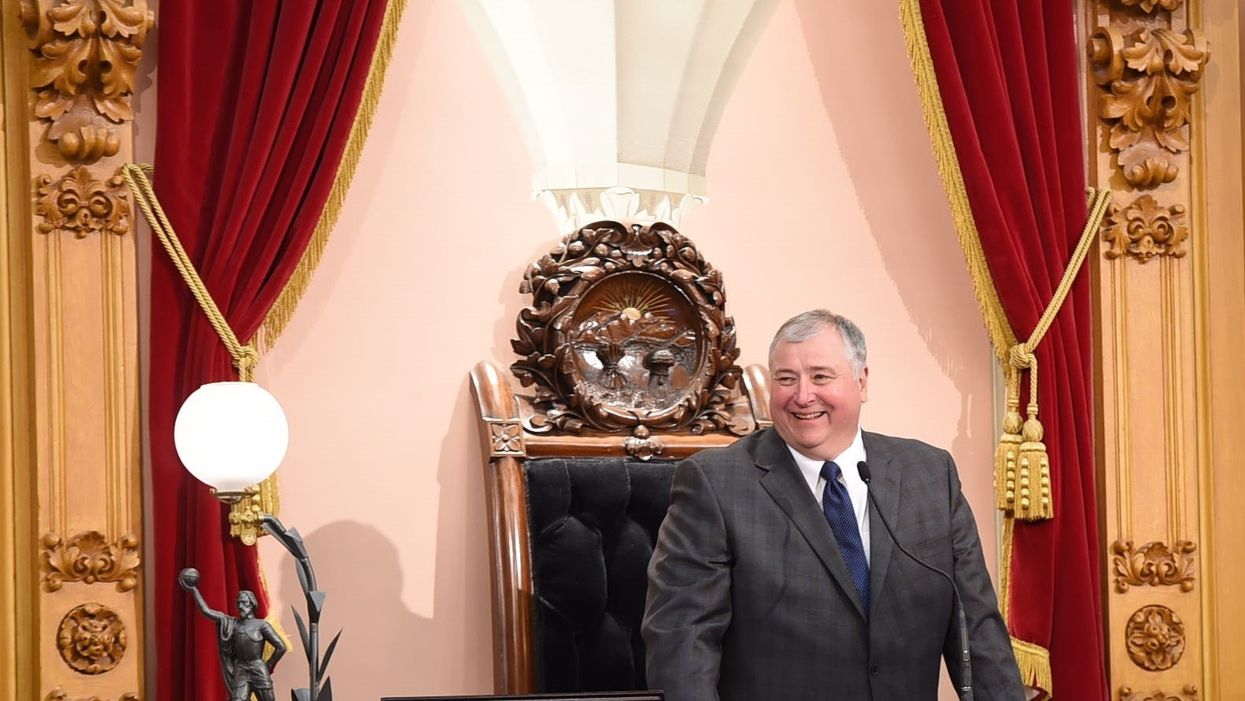Clements is the president of American Promise, which advocates for amending the Constitution to allow more federal and state regulation of money in politics. He was previously an assistant Massachusetts attorney general.
A federal grand jury has indicted the Republican speaker of the Ohio House in a $60 million bribery scheme. Meanwhile in Illinois, the Democratic speaker of the House has been implicated in a multimillion-dollar pay-to-play corruption scheme. Different parties, same game.
This latest Midwest swamp fest has all the features of American campaigns today: super PACs funded by a few corporate interests; dark money front groups; politicians strong-arming business people who need legislation; legislators who don't "go along" getting pushed aside; a revolving door between politicians and lobbyists; false attack ads and propaganda; crony capitalism; and utter contempt for the voters and taxpayers who get stuck with the bill.
Here's a short version of the the complaint and last month's federal racketeering indictment of the Ohio speaker, Larry Householder, and his henchmen:
In 2016, electric utility company First Energy had two failing nuclear power plants in Ohio. Company executives considered what they called a "legislative solution" — what the rest of us would call a "bailout."
Meanwhile, Householder wanted to make a comeback from an earlier scandal and reclaim the gavel he'd wielded in Columbus two decades earlier. In January 2017 he visited with First Energy. After a trip on the company's private jet, the deal was done.
Householder, his aides and lobbyists set up Generation Now, a tax-exempt organization (under section 501(c)(4) of the tax code) "to promote energy independence and economic development."
First Energy began making millions of dollars in "contributions" to Generation Now — and it started funding the campaigns of Householder and the legislators who then gave him the votes to be House speaker again.
Householder then introduced a bill to have Ohio ratepayers send an additional $1.3 billion to First Energy, keeping the nuclear plants open. In the face of balking legislators, First Energy ran millions of dollars more through Generation Now for "pressure campaigns" against wavering legislators. It worked: The bailout passed in two months.
Outraged and unhappy voters in Ohio responded by collecting 265,000 signatures to force a ballot referendum to repeal the bailout. At which point Generation Now and other front groups funneled $38 million from First Energy into misleading ads and tactics — defeating the ballot measure and keeping the bailout.
The bottom line: First Energy successfully turned a $60 million investment in campaigns into $1.3 billion in assured revenue at Ohians' expense.
In many ways, it's just another normal tale about the sway cash has over politics in recent decades, since the Supreme Court struck down multiple state and federal campaign finance laws using a new theory of money as speech protected by the First Amendment.
What is most surprising, perhaps, is that any investigation or indictments happened at all. It's true Householder and his allies got sloppy and greedy. They used some of the money for personal gain. They failed to comply with farcical non-coordination rules that magically transform dark money into "independent" free speech. So the indictments may well be rock-solid.
But this humiliation of American democracy in Ohio has all of the everyday features of our broken political system.
When reporters and analysts pressed the utility about the alleged bribery scheme, a "perturbed" CEO Chuck Jones insisted that the company acted "ethically." Complaining about the tone of the questions, Jones said, "It would be really nice if we get to actually talk about the great quarter we had."
In a sense, you can't blame him. Using a multimillion-dollar political spending scheme to secure subsidies, tax breaks and competitive advantage is common practice. It is not corruption or undue influence — it is "free speech." Using a "general welfare" nonprofit to hide the source of the money is not evasion of contribution limits — it is an "independent expenditure." A shake-down from, or a privileged back-door to, the speaker of the House is not corruption — it is "ingratiation" and "access."
Or so says the Supreme Court in decisions such as, most famously, Citizens United v. FEC a decade ago. That's why billions of dollars from corporations, unions, and extremely wealthy people flow into campaigns using the same mechanisms that were used in Ohio.
In the face of this systemic corruption, signs of reform and renewal are growing rapidly. Last year Americans named political corruption the No. 1 crisis facing our nation.
Millions across partisan lines have voted for a constitutional amendment to end unlimited election spending and secure free speech and representation for all. Other nonpartisan reforms such as ranked-choice voting, and end to partisan gerrymandering and full disclosure are gaining ground to put voters first.
This summer, a panel convened by the 200-year-old American Academy of Arts and Sciences completed a two-year study and 50 town halls with Americans around the nation. Its report, "Our Common Purpose," cites the "urgent threat to our democratic way of life" — and provides a detailed agenda for renewing the system by July 4, 2026, the 250th anniversary of the signing of the Declaration of Independence.
The indictments and investigations in Ohio and Illinois may well send a few people to jail. The question is whether the rest of us can muster the national will to fix the crime that is killing our national promise of equal rights, representation and government of we, the people.




















Marco Rubio is the only adult left in the room